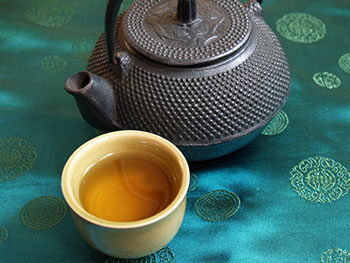More Health and Nutrition Bites
Related
Tea and Digestive System Cancers
The flavonoids found in grapes, tea, red wine, cocoa, and coffee have been linked to all sorts of positive health effects, from helping protect cognitive function to helping toprotect you from diabetes.
The Evidence for Weight Loss Supplements
With the number of overweight and obese adults in the United States estimated to be over 2/3 of the total adult population, it's no surprise that in 2010 US consumers spent an estimated $2.4 billion on weight loss supplements and meal replacements.
Good News for Those Who Love Chocolate, Wine or Tea
I've talked before about the positive effects of polyphenols, which are found in fruits like grapes and in tea, red wine, cocoa and coffee. The largest subtype of polyphenols are called flavonoids. There's been some really interesting research linking the intake of flavonoids and a reduced risk of Alzheimer's Disease and dementia in general.
Health & Nutrition Bites
Get the latest health and diet news - along with what you can do about it - sent to your Inbox once a week. Get Dr. Gourmet's Health and Nutrition Bites sent to you via email. Sign up now!
Have a cup of (green) tea

The polyphenols (antioxidants) in green tea have been shown in animal and in vitro studies to have protective benefits against cardiovascular disease and cancer. Human studies, however, have been small and their results varied. Drs. Kuriyama and Shimazu and their colleagues in Japan made use of data from a large, long-term prospective study to analyze the relationship between green tea consumption and the mortality rates due to cardiovascular disease, cancer, and all other reasons for death (JAMA 2006;166:1255-1265).
The study, called the Ohsaki National Health Insurance Cohort Study, enrolled 40,530 men and women between the ages of 40 and 79 who lived in the Miyagi Prefecture in northeastern Japan. (In this region, over half the population drinks 3 or more cups of green tea per day.) Persons with a history of cancer, heart attack, or stroke were excluded from the study. The researchers administered a questionnaire that asked about the subjects' "everyday diet" and requested information on such items as frequency of green tea, oolong tea, black tea, or coffee consumption; tobacco use; exercise level; body weight; height; and 36 food items.
After 7 and 11 years, the researchers identified all those study participants who had died and ascertained their cause of death, then correlated their cause of death with their level of green tea intake. They found that in general, the more green tea an individual drank, the lower their risk of death due to all causes. Indeed, that association was stronger for women than for men: For women who drank 5 or more cups of green tea per day, their risk of death was reduced by 23% over those women who drank only a cup or less. For men, that reduced risk was only 12%.
For risk of death due to cardiovascular disease, once again women enjoyed greater protective effects from green tea drinking than men: their risk of death from cardiovascular disease, for those drinking 5 or more cups of tea per day, was reduced by 31%. By contrast, the risk of death from cancer did not appear to be affected by green tea consumption, regardless of sex or other variables such as smoking, exercise, or Body Mass Index.
The researchers theorize that the reason women enjoyed greater protective effects from drinking green tea is that men were more likely to smoke: the inverse associations between green tea consumption and smoking was stronger for those who never smoked. They also noted that the protective effects were not necessarily linked to greater levels of green tea intake: drinking at least one cup of green tea a day had some protective effects for both men and women.
What this means for you:
Consider having a cup (or more) of green tea in place of another beverage in your daily routine. I enjoy it in the afternoons in place of another cup of coffee. It's a nice break - and your heart will thank you.
First posted: September 15, 2006
